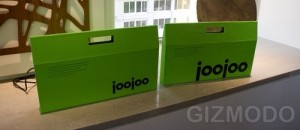The JooJoo, Bruce Lee’s Bad Moves and Lawsuits: Why the CrunchPad’s Demise Matters
This week Chandra Rathakrishnan released a keyboardless web tablet called the JooJoo {Engadget review}. Built to use the web as operating system, the project got its start as the CrunchPad. The CrunchPad demise and JooJoo phoenix have both been disappointing to the tech set following development for different reasons, and in the end both have larger implications.
This Bruce Lee would have had a better plan
During the live blog coverage of the announcement of the device, Rathakrishnan explained that the name was from an “African term for magical.” We’ll ignore the fact that Africa is a continent – not a country – and one with many different languages at that, to get back to what matters. If the device succeeds at this point, it will certainly be some kind of magic.
Today, Michael Arrington announced the TechCrunch lawsuit over the device. Fusion Garage, the company now producing the tablet allegedly got greedy and tried to eliminate TechCrunch’s interests in the device days before launch. Internal emails attribute the company’s shift in attitude to shareholder decision, the main one identified today as chiropractor Bruce Lee. On Fusion Garage’s side, Rathakrishnan counters that Arrington (and we’re guessing, by extension TechCrunch) didn’t provide any code to the project, failed to deliver on promised funding and connections and thus has no intellectual property rights. Arrington’s response? It was always clear that funding and connections were contingent on the launch of the device, and TechCrunch funded the hire of several hardware and software engineers to get the project to its current state, as well as assisting in immigration and travel arrangements for the Fusion Garage team to work alongside them in California.
By all accounts, the hardware and software of the JooJoo deliver on Arrington’s original idea for a tablet that ditches all other programs, to leave the web as OS and websites as applications.

JooJoo packaging, photo: Gizmodo
The real challenge to Fusion Garage, beyond appearing in an unsavory light while trying to convince early adopters to let them hold $500 for 8-10 weeks while the device is being built for mass consumption, will be succeeding where many, more formidable opponents have failed before. The Guardian’s Jack Schofield reminds us of the history of touch screen consumer flops from the likes of AMD, Microsoft (via the Tablet PC edition of Windows XP) and even Apple – rumored to be trying its luck with the tablet format device again.
For the JooJoo/CrunchPad to win where the Goliaths have lost (and are readying for a rematch) would require being embraced among early adopters and a significant pricing advantage for anyone else to swallow the tablet. At $500, from a company with questionable finances for production, a scorched bridge with one of the most popular blogs for early adopters and a general cloud looming over the reality of the device actually seeing the light of day, magic will likely not be enough. Arrington claims that his negotiated agreements with investors and retail distributors would have put the device in the $300 sweet spot that would make the device a more palatable impulse buy. In what looks to be a bit of a slap in the face, the JooJoo boxes even take on the black and green color scheme familiar to anyone who visits TechCrunch.
But the real loss comes from not getting to witness what’s possible from blogpreneurism. In fashion, the Sartorialist has his successful book, and is shooting campaigns for major labels like Burberry. Jane Aldridge, from Sea of Shoes, had her capsule collection with Urban Outfitters. While we have yet to see anyone make the leap from blogger to successful designer the signs are there.
While they’ve had success organizing a large scale tech event for 3 years, the CrunchPad would have set a new blogpreneur standard. It’s one thing to write about the topics you love, it’s another entirely to see that enthusiasm through to production of anything. Microsoft didn’t hesitate to invest in the content that appeared in their software (MSN, anyone?), the success of the iPod and iPhone stem in no small part from Apple’s decision to supply the music and entertainment for its various devices. And TechCrunch, which already has a millions strong content network, could have successfully reversed the model by supplying the devices on which they’re read. As newspapers and magazines debate blocking Google and questioning what type of paywalls can be erected to counter revenue losses, this was a full on, outside the box counter to the notion that new media businesses had to be built on variations of what we already know. Would it have worked? For the moment, it looks like we may never know.
